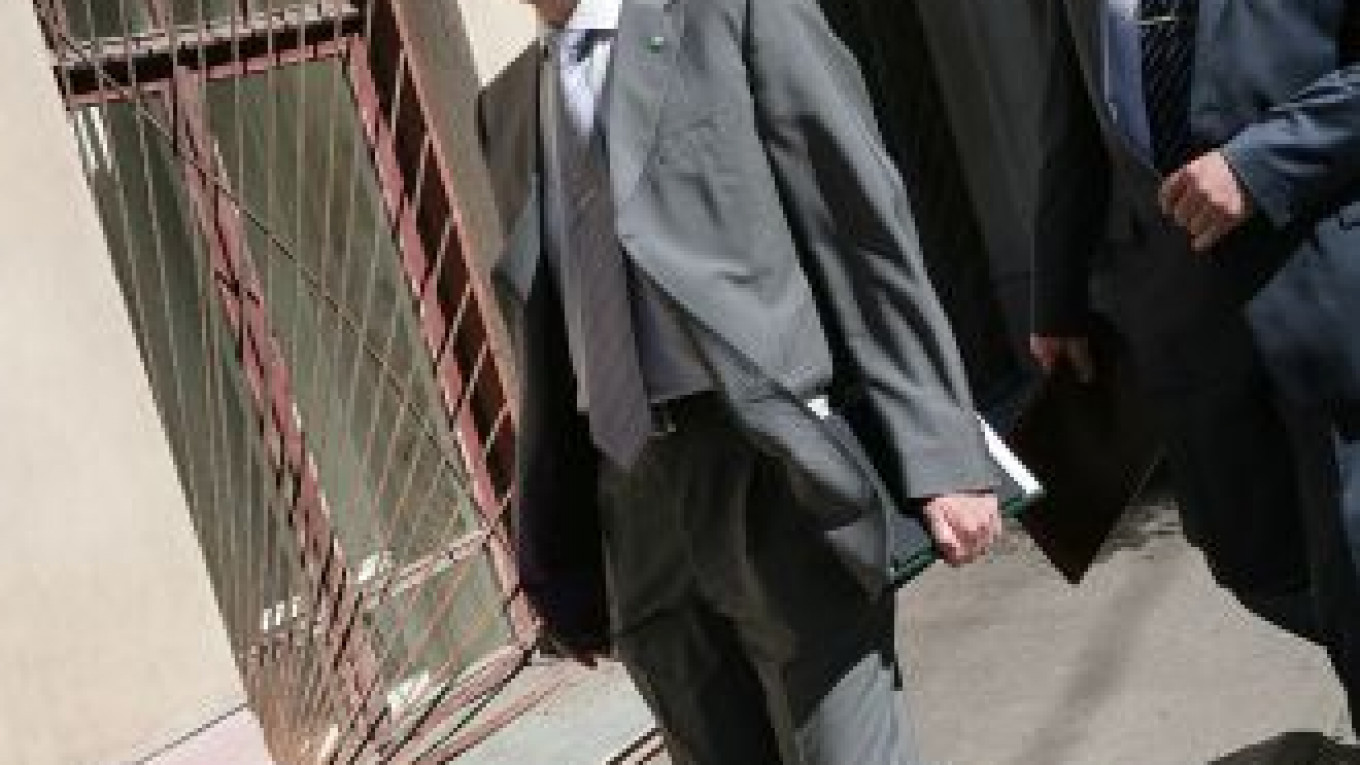Sberbank CEO German Gref offered support to former Yukos CEO Mikhail Khodorkovsky and his business partner Platon Lebedev on Monday, telling a Moscow court that he would have been aware of embezzlement at Yukos if it had been taking place as the state has charged.
Khodorkovsky and Lebedev are accused of stealing 350 million tons of oil — 20 percent of the country's annual oil production at that time. But Gref, who headed the Economic Development and Trade Ministry from 2000 to 2007, told the court that he had never heard about any such embezzlement.
Gref's guards arrived at Moscow's Khamovnichesky District Court an hour ahead of the Monday hearing and searched the courtroom, filled with dozens of reporters and spectators who had to fight for available seats.
Gref, freshly shaven and dressed in a gray suit, entered the courtroom with a slight smile. He spent more than two hours answering questions that Khodorkovsky, who looked pale but determined, asked from the glass-and-steel defendant's cage.
"If such an embezzlement had taken place, I would have been aware of that fact," Gref said of the charges against Khodorkovsky and Lebedev.
But he also acknowledged that his duties had not included direct control over oil transportation.
Khodorkovsky and Lebedev, who are serving an eight-year sentence for fraud and tax evasion, face another 22 1/2 years on related charges. Investigators said they stole $30 billion in oil by buying it from the company's subsidiaries for prices lower than those available on the global market.
But Gref said in court that it was legal to pay less for oil purchased in the regions where it was produced than for oil sold abroad.
"There can be no other way," Gref said.
Gref, who was summoned on behalf of the defense, did not make any statement about the legitimacy of the case and often sounded doubtful in his answers, frequently adding that he was not sure of the facts being discussed. ?
After completing his testimony, Gref rushed out of the courtroom, leaving his glasses lying on the witness stand.
Speaking to reporters after the hearing, Gref said he could not express his personal opinion on the case.
"I cannot give my evaluation of the trial when I don't even know the essence of the charges," Gref said. "I was testifying to the court, not in someone's favor."
The defense lawyers welcomed Gref's testimony.
"He confirmed things that are important for the defense and spoke composedly and cautiously," said Konstantin Rivkin, a defense lawyer for Lebedev.
State prosecutors did not comment on Gref's testimony.
Back in 2004, Gref said in an interview with the German weekly Die Zeit that he had "a bad opinion of Khodorkovsky" because the former Yukos CEO had been an active government lobbyist. But he never directly said Khodorkovsky was guilty of stealing oil.
Gref is not the first former high-ranking official to testify in the trial. In May, Mikhail Kasyanov, who served as prime minister from 2000 to 2004 and is now an opposition leader, said he considered the whole case against Khodorkovsky to be politically motivated.
Former Central Bank chief Viktor Gerashchenko called the charges “utter crap” in court on June 1.
Another high-ranking witness, Industry and Trade Minister Viktor Khristenko, is to testify on Tuesday morning.
Khodorkovsky's parents were present at the Monday hearing, as was actor Mikhail Yefremov, son of Oleg Yefremov, a star of Soviet cinema.
Yefremov, who said he attended on the advice of his mother, actress Alla Pokrovskaya, and not because of Gref's testimony, described the trial as "a psychological drama."
A Message from The Moscow Times:
Dear readers,
We are facing unprecedented challenges. Russia's Prosecutor General's Office has designated The Moscow Times as an "undesirable" organization, criminalizing our work and putting our staff at risk of prosecution. This follows our earlier unjust labeling as a "foreign agent."
These actions are direct attempts to silence independent journalism in Russia. The authorities claim our work "discredits the decisions of the Russian leadership." We see things differently: we strive to provide accurate, unbiased reporting on Russia.
We, the journalists of The Moscow Times, refuse to be silenced. But to continue our work, we need your help.
Your support, no matter how small, makes a world of difference. If you can, please support us monthly starting from just $2. It's quick to set up, and every contribution makes a significant impact.
By supporting The Moscow Times, you're defending open, independent journalism in the face of repression. Thank you for standing with us.
Remind me later.


